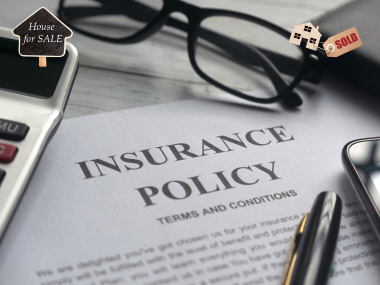
Understanding Homeowners Insurance: Key Components and Coverage
Getting homeowners insurance is an important way to protect your Minneapolis real estate investment, especially after you close on a home. Knowing the policy’s main parts and covering options can help you make smart choices when you need to change policies.

Most of the time, homeowners’ insurance protects the house, your belongings, your responsibility, and extra living costs. Dwelling security protects the structural parts of your home from dangers like fire and the bad weather that happens a lot in Minneapolis.
Liability coverage protects you from lawsuits if someone gets hurt on your land, and personal property coverage keeps your things inside the house safe from theft or damage. If your home becomes unlivable because of a protected loss and you need to stay somewhere else temporarily, your policy will cover some of your extra living costs.
When dealing with changes to your homes insurance after closing in the fast-paced Minneapolis real estate market, it’s important to carefully look at these parts to make sure you get full coverage that fits your needs.
Understanding Deductibles and Their Impact on Policy Costs
If you are buying a home in Minneapolis and are thinking about switching your homeowners insurance after the closing, it is very important that you understand expenses. Policyholders have to pay out-of-pocket costs called deductibles before their insurance coverage kicks in. These costs have a big effect on the cost of the policy.
Picking the right deductible can affect both your monthly premiums and the amount of money you might have to pay out of pocket during a claim in Minneapolis, where weather-related claims are frequent.
When you choose a bigger deductible, your premium payments are usually lower, but the first costs of filing a claim are higher.
If the deductible is low, on the other hand, the premiums are higher but the immediate costs of fixing damage are cheaper. Minneapolis homeowners should carefully think about their budgets and how much risk they are willing to take in order to choose a suitable deductible that strikes a good balance between low premiums and manageable risk in the real estate market.
For making smart choices about homeowners insurance coverage after the close, you need to know how these options affect the overall cost of the policy.
Legal Requirements for Homeowners Coverage After House Sale
In the Minneapolis real estate market, keeping your homeowners insurance after the close is not only a good idea, it’s the law. You need to protect your investment and follow the lender’s rules. Homeowners need to make sure that their insurance coverage doesn’t stop. If they don’t, they could face major financial problems and even legal issues.

Most mortgage lenders want borrowers to have an active policy that protects the home against risks like fire, theft, and natural disasters. Lenders may require force-placed insurance, which is usually more expensive and doesn’t protect as well as normal policies, if coverage expires.
Homeowners in Minneapolis should carefully read over their current policy terms before making any changes. If they need to, they should also work with their insurance company and loan to make the switch to a new policy go smoothly.
This care makes sure that local rules are followed and saves homeowners from unplanned events that could cause expensive repairs or a drop in the appraised property value.
The Process of Changing Homeowners’ Insurance After Closing
In the Minneapolis real estate market, there are a few important steps you need to take to change your home insurance after the close. After you close on your new home, you should carefully go over your old homeowner’s insurance policy to make sure it still covers your needs and fits the needs of your new house.
The first thing you should do is look into different insurance companies. Compare quotes and policy information to find full coverage that fits your budget. Talk to possible insurers about custom choices for protecting your Minneapolis home, taking into account local risks like bad weather.
When you choose a new provider, let your mortgage lender know. They may need proof that you have enough coverage before you can finalize the switch. Work with both the old and new providers to agree on a date for the switch, making sure that coverage doesn’t end.
Make sure that any escrow accounts that are connected to the mortgage have the new policy information added so that the premium payments are handled properly and there are no problems.
Benefits of Switching Homeowners Insurance Providers Post-Closing
If you buy a home in Minneapolis and then decide to switch homeowners insurance companies, you can get a lot of benefits. One of the main benefits is that you can save money because looking for new policies often leads to better deals that can lower your monthly payments.

Changing insurance providers also lets homeowners tailor their coverage more exactly to their changing needs after the closing. This gives you enough options to protect yourself from risks that are specific to the Minneapolis area, like bad weather or certain property issues.
Also, if homeowners move insurers, they might get better customer service and faster claims processing, which can be very helpful in an emergency. Comparing different insurance companies can also help you combine your plans, which could mean saving even more money by combining your home and car insurance.
Overall, looking into new options after the closing gives homes more control over their insurance policies and financial obligations in the fast-paced Minneapolis housing market.
Important Considerations When Changing Homeowners Insurance in Minneapolis, MN
There are a few important things to think about when switching homes insurance in the Minneapolis real estate market to make sure coverage goes smoothly and your finances are safe. First, it’s important to get quotes from more than one insurance company to find the best rates that fit your budget and give you the full coverage your property needs.
Pay close attention to things like insurance limits, deductibles, and extra coverages like flood or windstorm protection, which can be very important in Minneapolis because of the weather. Also, it’s important to go over the details of your present policy before making any changes. Knowing the cancellation rules and possible fines can help you avoid extra costs.
Talk to your mortgage lender; they may need to be told about the change and may have specific rules about homeowner’s insurance plans. When you move policies should also be carefully planned so that you don’t lose coverage during the change.
Working with a local insurance agent who knows how the housing market works in Minneapolis can give you useful information and help you understand your policy’s complicated details.
Steps to Cancel Your Current Homeowners Insurance Policy Properly
To properly end your current homeowners insurance policy after closing on a home in the Minneapolis real estate market, you need to make sure you follow certain steps. First, look over your current policy to see if there are any cancellation fees, terms, or notice times that your insurance company wants you to know about.

Talk to your insurance agent about your plans to stop and ask for written confirmation of the cancellation process. Before you cancel your old homeowners insurance policy, get a new one. Continuing coverage is essential to protect your investment and meet mortgage lender standards.
Once you have a new policy, show your lender proof that you are covered and make sure that all the paperwork has been sent in. Lastly, check with both insurance companies to make sure the cancellation went through correctly. Also, look for any final bills or refunds from the old policy.
These steps are very important to make sure that you can handle the change smoothly in the competitive Minneapolis real estate market while still protecting your home well.
What to Do If You Face Penalties for Early Cancellation of a Policy
If you have to pay a fee to stop your homeowners insurance early in the Minneapolis real estate market, it’s important to plan ahead to lower your costs. First, look over the terms of your present policy to find out what cancellation fees or penalties are in place.
Talk to your insurance company about lowering these fees by pointing out how loyal you are and how long you’ve been a customer. You might also want to look for new insurance choices that offer better rates or bonuses for switching, which could help cover the costs of canceling the old plan.
Talking to an independent insurance agent in Minneapolis can help you figure out how to keep your costs as low as possible while still getting enough coverage during your shift. Also, it’s important to keep track of your conversations with your insurer for future reference and possible dispute settlement.
Keep up with the rules your state has for insurance policies. For example, Minnesota laws might have rights or guidelines that could affect the fines you have to pay if you change your home insurance after closing on the house.
How to Compare Homeowners Insurance Policies for Better Coverage
When looking for homeowners insurance in Minneapolis, it’s important to think about several different factors to get the best coverage for your house. First, look at how much each insurance covers. This should be enough to protect you from risks that are specific to the area, like the bad weather that is common in Minneapolis.

Think about what kinds of risks are covered and whether you need extra endorsements or riders to cover floods or other things that aren’t usually covered by standard plans. Pay close attention to the deductible amounts and how they affect your premium to find the right balance between cost-effectiveness and security.
Check the liability coverage of each policy to make sure it meets your needs and gives you enough financial protection in case someone sues you or something happens on your land. Read reviews and look at scores from reputable sources like J.D. Power or A.M. Best.
As a homeowner in Minneapolis, you should get quotes from several insurance companies and compare them based on price and the types of policies that meet your needs.
Tips for Negotiating Better Rates with Your New Insurer
If you buy a house in Minneapolis and then change your homeowner’s insurance after the closing, it is very important to deal well with your new insurance company to get better rates. First, do a lot of study on a few different insurance companies and compare their coverage options and prices.
Bring up any special features of your home that might get you a discount, like new security systems or changes that make it more energy-efficient. You might be able to get a discount on your home insurance if you bundle it with other policies, like car insurance.
Having a good credit score can also help you negotiate better terms, which could lead to lower rates. It’s a good idea to find out if your insurance company has any loyalty programs or other long-term bonuses for customers who keep buying from them.
Additionally, raising your deductibles may lower your premiums, but make sure that this is in line with your ability to pay for any possible out-of-pocket costs. As the real estate market in Minneapolis is always changing, you can get better terms from your new homeowner’s insurance company if you carefully prepare and know what your home needs.
Comparing Local vs National Homeowners Insurance Companies in Minnesota
When you’re looking for a home in Minneapolis, especially after closing on a new one, it’s important to decide whether you want to work with a local or national homeowners insurance company. In Minnesota, local insurance companies often offer personalized service and know a lot about the risks that are unique to the area, like winter storms and floods.

They might have coverage choices that are specifically made for homeowners in the Minneapolis area. On the other hand, national insurance companies may have more competitive rates because they have more customers and more resources. This can lead to more policy choices and possibly lower premiums.
But they might not have the human touch and in-depth knowledge of the area that can be necessary to handle home insurance needs that are unique to Minnesota’s weather. When you compare these options, you need to think about things like customer service, how quickly claims are processed, coverage details, and cost-effectiveness to make sure that your homeowners insurance fits your personal preferences and the area where you live in Minneapolis.
Should I Change My Home Insurance After Closing?
To answer your question, you can change your home insurance after closing on a house in Minneapolis. A lot of people find that they need to review their insurance needs after they’ve bought a house.
It is possible to change your insurance after the closing, whether you want better coverage, lower premiums, or more comprehensive protection that fits the challenges of living in Minneapolis. Before you start this process, you should look over your present homeowners insurance policy and see if there are any better ones in Minneapolis.
It’s important to make sure that any new insurance you buy meets the needs of your mortgage lender. When choosing a new plan, you should also think about things like the weather-related risks that are common in Minnesota.
Once you’ve found a good homeowner’s insurance company, work with them to make sure the change goes smoothly and there are no gaps in coverage. To keep things simple and up to date, let your mortgage company know about the change. At Henry Home Buyer, we’re proud to serve Minnesota homeowners by buying houses fast, for cash, and as-is. We even buy houses and can help you with selling your inherited house. Learn more about our simple process and see what locals say in our reviews. When dealing with the fast-paced Minneapolis real estate market, keep in mind that moving your home insurance could save you money and give you more peace of mind.
Is There a Penalty for Switching Home Insurance?
If you are thinking about switching homeowners insurance after closing on a house in Minneapolis, it’s important to know what the consequences and fines might be. There aren’t usually any direct consequences for switching home insurance companies, but when you do it and the terms of your policy can be very important.

If you move insurance companies before the end of your current policy term, many of them may charge you a fee. It is important to look over your current contract to see if there are any early termination terms that could cost you extra money.
Additionally, it is very important to work together smoothly with your mortgage lender to make sure you meet their needs and keep your benefits intact. Changing home insurance can also have an effect on escrow accounts, which are widely used in the Minneapolis real estate market to keep track of property taxes and insurance payments.
Always carefully compare new quotes to make sure that better rates or more coverage will help you reach your financial goals without causing any unintended problems.
Can I Switch My Homeowners Insurance Anytime?
It is possible to change your homeowners insurance after closing on a home in the Minneapolis real estate market. In fact, it may be a good idea to do so to make sure you get the best coverage for your needs. In Minneapolis, homeowners can change their insurance policy whenever they want, even after the close. They are not stuck with the policy they chose at the beginning.
It is very important to regularly look over your current home insurance policy and see if there are any better ones out there. If you can find better coverage or lower premiums from another company, moving can be very helpful.
But before you switch, it’s important to think about any cancellation fees or changes to the terms of your coverage. Also, let your mortgage lender know about any changes so that there are no problems with your deposit accounts or your ability to meet compliance requirements.
In order to make smart choices about when and how to change your homeowners insurance, you should know about your insurance options and how the Minneapolis real estate market works.
Will Changing Home Insurance Affect a Mortgage?
Changing your homeowners insurance after closing on a home in the Minneapolis real estate market can affect your mortgage, but it’s important to know what that means and how it works. When you change your home insurance, you need to make sure that your coverage stays the same so that your mortgage lender is happy.

Lenders usually have strict rules about homeowner’s insurance policies, like the minimum amount of coverage needed and the types of insurers that are accepted. Lender-placed insurance, which is usually more expensive and provides less safety, can happen if you don’t keep enough coverage.
If your homes insurance changes, you should let your lender know right away so that your mortgage doesn’t get messed up. This lets changes be made to trust accounts if necessary, making sure that premiums are paid on time without affecting mortgage payments. Dealing with problems as they come up can help you sell your Minneapolis home more quickly, even if you have an ongoing insurance claim. We buy houses in Minneapolis, Saint Paul, Bloomington, Maple Grove, Plymouth, and throughout Minnesota. Sell your home fast, no matter where you are in the state. Because the real estate market in Minneapolis is always changing, knowing about these changes to insurance helps protect both your property and your mortgage agreement.
Helpful Minneapolis Blog Articles
- Understanding Home Staging Costs In Minneapolis
- Required Documents For Selling Your House In Minneapolis, MN
- Selling Without a Real Estate Professional in Minneapolis
- Understanding Minneapolis Vacant Property Regulations
- FSBO Costs For Home Sellers In Minneapolis, MN
- Do I Need A Lawyer To Sell My House In Minneapolis, MN?
- Selling A House With A Pending Insurance Claim in Minneapolis
- Inherited A House With Siblings in Minneapolis, Minnesota
- Can I Change Homeowners Insurance After Closing In Minneapolis
- Selling An Inherited House In Minneapolis, Minnesota
- Effortless Excise Tax Calculator For Minneapolis
- How to Stop Foreclosure on Your Home in Minneapolis MN
- Selling a House with a Mortgage Work in Minneapolis MN
- Fixing Up a House to Sell in Minneapolis MN
- Can the Seller Back Out of a Real Estate Contract in Minneapolis, MN?
- How Do You Buy a House Before Selling Yours in Minneapolis, MN

| INSURANCE CARRIER | INSURANCE INDUSTRIES | HOME LOAN | MORTGAGEE CLAUSE | MORTGAGE LOAN | LOAN |
| MONEY | TITLE INSURANCE | TITLE COMPANY | APPRAISAL | FINANCIAL INVESTMENT | INTEREST |
| CONSUMERS | UNDERWRITING | PRICE | OWNERSHIP | MORTGAGE INSURANCE | LIFE INSURANCE |
| REAL ESTATE AGENTS | PLUMBING | INTEREST RATE | HEATER | HVAC SYSTEM | CREDIT CARD |
| BANK |
